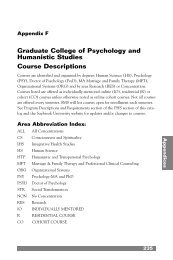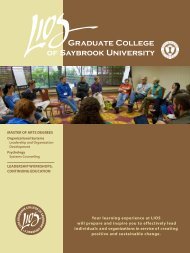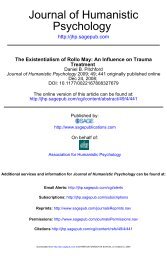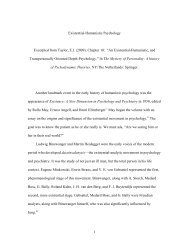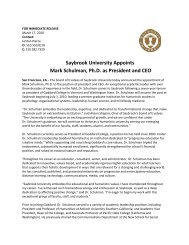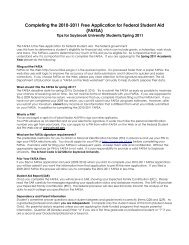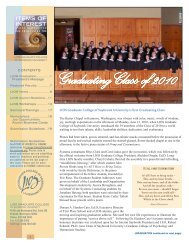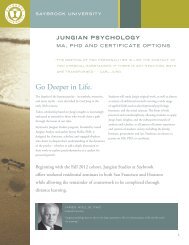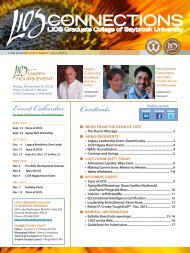Mar 2011: Connections - Saybrook University
Mar 2011: Connections - Saybrook University
Mar 2011: Connections - Saybrook University
You also want an ePaper? Increase the reach of your titles
YUMPU automatically turns print PDFs into web optimized ePapers that Google loves.
15<br />
By Chris Crosby, MA<br />
Under-Functioning:<br />
Its Role in the Sponsor Agent<br />
Target Advocate Theory<br />
Chris Crosby, MA<br />
(LIOS ’96, ’97), In 1992, Darryl Conner<br />
is a graduate of<br />
published his famous book<br />
both the Managing<br />
titled “Managing at the Speed of<br />
and Consulting<br />
(’96) and the<br />
Change,” which is about managing<br />
Systems Counseling in fast-moving organizations. The<br />
(’97) programs. book outlines his theory of change<br />
He has been an<br />
called Sponsor Agent Target Advocate<br />
organizational<br />
development<br />
(SATA). SATA highlights key roles<br />
professional since around daily tasks, projects or<br />
1993, including eight changes that are both universal to all<br />
years internal with<br />
organizations and critical for success.<br />
Alcoa CSI, one of 22<br />
business units within<br />
Alcoa. Chris currently The roles are:<br />
is the West Coast<br />
The Sponsor (initiating or sustaining),<br />
President of Crosby<br />
& Associates. His who legitimizes the change or work<br />
e-mail is c_p_crosby@ The Change Agent, who facilitates<br />
yahoo.com.<br />
the change or work<br />
The Advocate, who has an idea or wants things to be different<br />
The Target, who carries it out<br />
No matter what official role or function you play in an<br />
organization, you are also in at least one SATA role, which<br />
has specific behaviors needed for successful work, projects or<br />
change. The dilemma, of course, is that the majority of us are<br />
unaware of the SATA roles we are in and are thus unsure of<br />
how to leverage those roles for success.<br />
Two years later, in 1994, Robert P. Crosby published his<br />
book titled Solving the Cross-Work Puzzle, which took<br />
Conner’s work and combined it with Crosby’s theory of how<br />
authority works within organizations. [Ed. Note: Robert<br />
Crosby is LIOS’ founder and is the author’s father.] The<br />
clarity added here (and verified in a conversation between<br />
Conner and Crosby) was about the role of Sponsor—<br />
specifically, the critical distinction being that you can only<br />
“sponsor” your direct reports.<br />
Another critical component about sponsorship is the<br />
distinction between the sustaining and initiating Sponsors. The<br />
initiating Sponsor is a single person above all people who must<br />
do the task, project or major change, while the sustaining Sponsor<br />
is the direct supervisor of the Target. The clarity that Crosby<br />
created highlights the importance of building sponsorship at the<br />
sustaining Sponsor level.<br />
SATA, with Crosby’s adaptation, has influenced everything I<br />
[have done] as an organizational development consultant over my<br />
15-plus years of practice. Using SATA to chart out a problem or<br />
dilemma has proven to be an important analysis tool in building<br />
strategies for success. In SATA terms, I have lived my professional<br />
life in the role of a Change Agent with no authority over anyone<br />
with whom I am working. What I do have is lots of influence<br />
through technical, interpersonal and referent means. (“Referent”:<br />
is the word-of-mouth stories told about you.)<br />
As a Change Agent, I have always been heavily influenced by<br />
SATA and the concept of “over-functioning.” Essentially, overfunctioning<br />
is when you, without having authority, tell others<br />
that they have to do what you say. It is acting as if you are boss<br />
when you really aren’t.<br />
Over-functioning happens all the time and creates all sorts of<br />
problems in organizations. Its dangers have always been taught as<br />
a core part of SATA.<br />
During my years of internal and external consulting, I began to<br />
notice a pattern in organizations beyond what is traditionally<br />
taught in SATA. Over-functioning helps explain some aspects of<br />
how systems get stuck with unclear and confused authority; yet<br />
it misses other aspects. Many people allow things to slip or go<br />
unnoticed. These employees are acting under the real authority<br />
they are expected to take (whether clarified or not).<br />
Not stepping up and taking appropriate authority adds a critical<br />
piece as to why tasks don’t get done, projects slip and changes<br />
fail. I call this behavior “under-functioning,” as it amounts to<br />
letting things slide.<br />
Here are some examples of how under-functioning has impacted<br />
some fairly common work situations:



